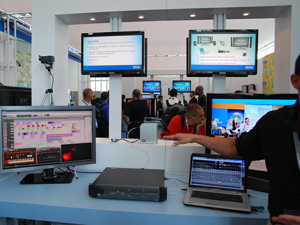



Date:13/09/11
 Hardware giant Intel and software giant Microsoft will see their premier developer events kick off this week, the Intel Developer Forum (IDF) in San Francisco, and Microsoft's BUILD conference in Anaheim, Los Angeles.
Hardware giant Intel and software giant Microsoft will see their premier developer events kick off this week, the Intel Developer Forum (IDF) in San Francisco, and Microsoft's BUILD conference in Anaheim, Los Angeles.
At IDF, Intel is expected to unveil new processors for its Ultrabook technology, seeking to compete with ARM in the smaller form factor mobile device market.
Both US vendors face different aspects of the same challenge, how to excel in both hardware and software likely to run tomorrow’s personal compute devices, and effectively compete with Apple and Google in this device market.
Microsoft's main competitors are Android and iOS, but with the release date of Windows 8 now expected to be late 2012 or even early 2013, both Apple and Google will have had a two- or even three-year head start in developing their operating systems for the next generation of personal computing devices.
Regular posts on Microsoft’s MSDN blog ‘Building Windows 8’ have provided some insight into the operating system's likely features, and the devices it will support.
Microsoft demonstrated its ARM-based Windows 8 tablets at the Computex event in Taipei earlier in May, much to Intel's consternation: Intel is in a fierce battle with ARM-based manufacturers nVidia, Qualcomm and Texas Instruments in the tablet processor market place.
The latest blog authored by Microsoft president of the Windows and Windows Live Division Steven Sinofsky details the use of Microsoft’s virtualisation technology Hyper-V in Windows 8.
Other blog posts have outlined Windows 8's superior file management, USB 3.0 support, and new user interface, which was previewed at Microsoft’s D9 conference earlier in June 2011.
Microsoft corporate VP for Windows Experience Julie Larson-Green said in her blog: "There will be fast launching of apps from a tile-based Start screen, with a customisable, scalable full-screen view, as well as live tiles with notifications, showing always up-to-date information from your apps."
Intel and Microsoft developers gather as rivals turn up heat in crucial mobile market
 Hardware giant Intel and software giant Microsoft will see their premier developer events kick off this week, the Intel Developer Forum (IDF) in San Francisco, and Microsoft's BUILD conference in Anaheim, Los Angeles.
Hardware giant Intel and software giant Microsoft will see their premier developer events kick off this week, the Intel Developer Forum (IDF) in San Francisco, and Microsoft's BUILD conference in Anaheim, Los Angeles.At IDF, Intel is expected to unveil new processors for its Ultrabook technology, seeking to compete with ARM in the smaller form factor mobile device market.
Both US vendors face different aspects of the same challenge, how to excel in both hardware and software likely to run tomorrow’s personal compute devices, and effectively compete with Apple and Google in this device market.
Microsoft's main competitors are Android and iOS, but with the release date of Windows 8 now expected to be late 2012 or even early 2013, both Apple and Google will have had a two- or even three-year head start in developing their operating systems for the next generation of personal computing devices.
Regular posts on Microsoft’s MSDN blog ‘Building Windows 8’ have provided some insight into the operating system's likely features, and the devices it will support.
Microsoft demonstrated its ARM-based Windows 8 tablets at the Computex event in Taipei earlier in May, much to Intel's consternation: Intel is in a fierce battle with ARM-based manufacturers nVidia, Qualcomm and Texas Instruments in the tablet processor market place.
The latest blog authored by Microsoft president of the Windows and Windows Live Division Steven Sinofsky details the use of Microsoft’s virtualisation technology Hyper-V in Windows 8.
Other blog posts have outlined Windows 8's superior file management, USB 3.0 support, and new user interface, which was previewed at Microsoft’s D9 conference earlier in June 2011.
Microsoft corporate VP for Windows Experience Julie Larson-Green said in her blog: "There will be fast launching of apps from a tile-based Start screen, with a customisable, scalable full-screen view, as well as live tiles with notifications, showing always up-to-date information from your apps."
Views: 1302
©ictnews.az. All rights reserved.Similar news
- Mobile operators of national market to reduce roaming tariffs
- Iran vows to unplug Internet
- China Targeting Telecoms in Corruption Probe
- Bangladesh to use electronic voting system for next elections
- Philippine IT sector to launch five-year digital strategy plan
- Russian Premier Vladimir Putin meets ITU Secretary-General Hamadoun Touré
- US lawmakers propose to regulate use of geolocation data
- Unlimited mobile data plans dying as telcos gear up for cloud future
- Europe at risk of falling behind US and Asia on 4G use
- Netherlands first to regulate on net neutrality
- Korean Co Takes Aim At Display Patents
- Regulators, Banks Look for IT Hires After Breakdowns
- Electron transactions spreading
- Schools in remote rural areas will connect to the single database via network without SIM
- Obama to Personally Tweet From Twitter Account





















